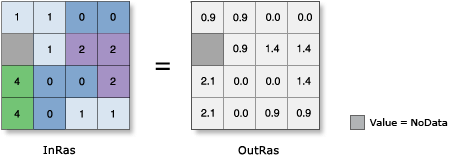Available with Image Analyst license.
Available with Spatial Analyst license.
Overview
Calculates the inverse hyperbolic sine of the pixels in a raster.

Notes
In mathematics, all trigonometric functions have a defined range of valid input values, called the domain. The output values from each function also have a defined range. For this tool, the domain and range are as follows:
- Domain: -∞ < [in_value] < ∞
- Range: -∞ < [out_value] < ∞
The input values to this tool are in radians. If degrees are desired, the resulting raster must be multiplied by the radians-to-degrees conversion factor of 180/pi, or approximately 57.296.
The output raster is always a floating-point type, regardless of the input value type.
If the input is a multiband raster, the output will be a multiband raster. The function will perform the operation on each band in the input.
If the input is a multidimensional raster, all slices from all variables will be processed, and the output will be a multidimensional raster.
Parameters
| Parameter name | Description |
|---|---|
Raster | The input for which to calculate the inverse hyperbolic sine values. |
Extent Type | Choose which extent should be used in the output raster:
|
Cellsize Type | Choose which cell size to use in the output raster. If all the input cell sizes are the same, all the options will yield the same results.
|